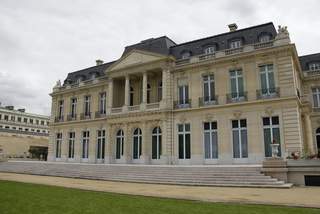
Seat of the OECD, Château de la Muette, Paris © Fotolia/Atlantis
The Voice of Business at the OECD
Founded in 1948, the Organisation for European Economic Cooperation (OEEC), the predecessor to the OECD, played a central role in the reconstruction of Europe after World War II, including administrating the Marshall Plan. After the successful reconstruction of Western Europe and in the course of the economic prosperity of the 1950s, the founding mandate of the OEEC became obsolete. As there was nonetheless the need for coordination, the Organisation for Economic Co-operation and Development (OECD) was born out of the OEEC in 1961.
Since then, many more countries have joined the organization. Today, 35 OECD member countries worldwide use the OECD to coordinate their economic policies.
Goals and Overall Structure of the OECD
The signatory states of the OECD aimed to promote policies that seek to:
- Achieve optimum sustainable economic development and employment as well as a rising standard of living in order to contribute to the development of the world economy;
- support healthy economic growth in both member states and non-member states undergoing economic development; and
- contribute to the expansion of world trade on a multilateral, non-discriminatory basis, in accordance with international obligations.
The OECD serves as a permanent intergovernmental forum for exchange on common economic and monetary policy issues. Representatives of the OECD countries discuss economic, environmental, scientific and social policy issues in some 300 specialised committees, expert groups, and working groups. The OECD also serves as economic think tank, collecting data and analyzing economic trends. Its “soft power” role sets it apart from other international organisations as a global agenda-setter and norm creator.
The organisation’s highest decision-making body is the Council, in which the member states are represented by their ambassadors. For a decision or recommendation to be taken, the consensus of all members is necessary.
Real-Life Expertise: Business at the OECD
In order to live up to its mandate, the OECD works together with representatives of industry and trade unions from its member states through two committees:
- Business and Industry Advisory Committee to the OECD (Business at the OECD)
- Trade Union Advisory Committee (TUAC)
Business at the OECD is the umbrella organisation of the leading business federations of all OECD countries. It was founded in 1962 – just one year after the establishment of the OECD. Today, a total of 44 business associations are represented in Business at the OECD – including, in the case of Germany, the Federation of German Industries (BDI) and the Confederation of German Employers’ Associations (BDA). In addition, twelve industrial federations from non-OECD states have observer status, which enables them to take part in the Business at the OECD process. Thanks to their vast experience gained from their day-to-day entrepreneurial activities, Business at the OECD members offer the OECD valuable expertise on how to create a business-friendly environment and improve living conditions.
BDI promotes the interests of German industry over 40 Business at the OECD committees, expert groups and task forces. Over 160 representatives of German business contribute with their knowledge and experience to Business at the OECD committees, expert groups and task forces; over 40 of these representatives are BDI employees. The various committees deal with issues ranging from trade and investment policy to taxation, health, climate change, and policy on small and medium-sized enterprises. In addition to foreign trade and cross-border direct investment, the current focus is on digitalization and inclusive growth.



